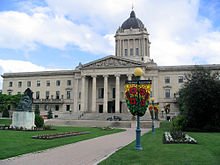Posted: November 17, 2017
In response to the call for engagement by Manitobans in the development the 2018/19 Provincial Budget, CCEDNet Manitoba prepared a brief with 20 recommendations in a range of areas, guided by our member created and endorsed policy resolutions. Our brief was sent to the Honourable Cameron Friesen, Minister of Finance.
The Province has a website indicating ways you can participate in these important consultations. To learn more, or to find out how you can use this document to draft your own pre-budget submissions, contact Darcy Penner at d.penner (at) ccednet-rcdec.ca or 204-943-0547.
Read CCEDNet Manitoba's full 2018-19 pre-budget submission
CCEDNet Manitoba Recommendations
- Manitoba must release a comprehensive poverty reduction plan. This plan must be developed in consultation with community members and include targets and timelines for reducing poverty. We believe The View From Here provides a blueprint for this work.
- Manitoba must introduce a new basic needs benefit to lift all Manitobans up to or above the poverty line.
- Support social enterprise development in Manitoba by committing to co-creating and co-producing a second phase of the Manitoba Social Enterprise Strategy beginning in 2018/19, with a mission of supporting social entrepreneurs focused on job creation and training for people facing barriers to employment.
- Develop a strategy, allocate resources and initiate the development of community-owned renewable energy on all 63 First Nations within ten years. Support for the implementation would require consultation with all communities affected and for Manitoba Hydro to purchase power from these initiatives through implementation of a long-term Feed-In-Tariff program overseen by an independent committee.
- Reverse the trend towards increasing incarceration and focus on meaningful employment for people with barriers to employment. Partner with and support social enterprises that provide wrap around supports for reintegration of appropriate offenders and reinvest the savings accrued through reduced recidivism rates into community-led, poverty reduction priorities.
- Implement and resource a comprehensive rural economic development strategy that recognizes and addresses the diversity of local economies, demographics and geography in Manitoba through local decision-making and consultation processes.
- Support organizations and initiatives providing long-term supports to Indigenous job seekers facing multiple barriers to employment and employers committed to inclusive hiring.
- Provide funding for the addition of 300 net new social and affordable housing units built by the public, non-profit and co-op sectors annually so that Manitoba does not continue to fall behind.
- Continue to make Rent Assist available to low-income Manitobans on and off of EIA.
- Pro-actively work with housing providers and invest to ensure there is no net loss of rent-geared-to-income (RGI) housing units due to expiring federal operating agreements.
- Make annual investments of at least $126M to meet the estimated need for capital repairs and maintenance in public housing units by 2020.
- Lobby provincial counterparts and the federal government to create and fund a national housing strategy.
- Create 12,000 new licensed and funded not-for-profit early learning and child care spaces while also investing resources to ensure existing spaces are sufficiently funded.
- Invest in initiatives to recruit and train enough early childhood educators to meet the legislated requirements for proportion of trained staff in the 12,000 new spaces.
- Immediately eliminate the $2.00 daily child care fee and increase the income level at which families are eligible for a full fee subsidy, with annual indexing to ensure families do not unfairly lose out on subsidies in the future.
- Establish 30 community-based Aboriginal head start programs in and around high-needs schools across Manitoba by 2020.
- Invest in community-led development with multi-year, streamlined funding that includes the following characteristics:
- A targeted approach that identifies and invests in key neighbourhoods and communities in the greatest need of physical, social and economic revitalization;
- Multi-year agreements to a maximum of five years, including cost of living increases on an annual basis;
- Creating effective communication channels between the Province of Manitoba and community-based organizations, allowing agencies to provide feedback and make recommendations, as well as providing agencies with a year’s notice of renewal decisions, thereby ensuring agencies have sufficient time to plan.
- Support scaling up community-led efforts to address local challenges of food insecurity and unemployment in northern and remote communities through the Northern Healthy Foods Initiative as well as social enterprises focused on food production and consumption.
- Invest $160,000 annually in a Manitoba food strategy and action plan with implementation oversight by a Food Policy Council composed of relevant stakeholders.
- Support co-operative development in Manitoba by supporting a sector development strategy in full partnership with the co-op sector.
Read CCEDNet Manitoba's full 2018-19 pre-budget submission
CCEDNet News (homepage):
Categories:
Government
Policy Development & Advocacy
Image names (local):
archives.ccednet-rcdec.ca
parliamentwinnipeg_manitoba_0.jpg
Image URLs (local):
https://archives.ccednet-rcdec.ca/
https://archives.ccednet-rcdec.ca/sites/archives.ccednet-rcdec.ca/files/parliamentwinnipeg_manitoba_0.jpg
File names (local):
2018-19_mb_budget_submission_from_ccednet_manitoba.pdf
File URLs (local):
https://archives.ccednet-rcdec.ca/sites/ccednet-rcdec.ca/files/ccednet/documents/2018-19_mb_budget_submission_from_ccednet_manitoba.pdf
